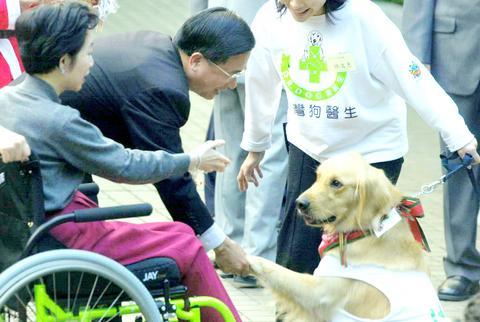Next year's presidential election will be Chen Shui-bian's (
"I am quite happy about next year's election. The first reason is that we just had a new member of the family, small An-an [her grandson Chao Yi-an (

PHOTO: CHIANG YING-YING, TAIPEI TIMES
"The second reason is that in next year's election, no matter the outcome, it will be Chen Shui-bian's last battle. After that I don't have to campaign for him anymore," she said.
"He will be campaigning for me in the future instead," Wu, who was once a legislator, joked.
Wu made the statement during a tea party at the president's residence yesterday. The president and the first lady threw the party for physically and mentally handicapped children, Vincent Kabore from Burkina Faso and Huynh Thi Van from Vietnam who came to Taiwan for medical treatment, and "doctor dogs," which are trained to help people with various therapies.
The dogs were the stars at the party. Chen and Wu played with the dogs and Chen addressed the issue of China and Taiwan again by telling a story of his dogs, Yung-ko (
"When I look at the doctor dogs, I think of my own Yung-ko and Honey. There was one day when Yung-ko and Honey got into a fight, and I asked them what happened," Chen said.
"Yung-ko said that Honey tried to provoke him, and I thought, how would 2kg Honey have wanted to provoke 30kg Yung-ko? Then Honey told me that Yung-ko aimed his slingshot at her, and she just shouted, `don't hurt me,' and Yung-ko said it was provocation."
Wu also recounted the story of their golden retriever, Freedom. She said that when they had Freedom, they gave it the best care they could, but it died after eight months because of kidney problems.
"But my daughter saw a dog on the street one day, and it was led by a poor old man collecting garbage. It was rainy and cold, and that dog was only covered by plastic. Yet that dog seemed to survive well," Wu said.
"Sometimes people are like that. They live better when they are in an harsh environment," she said.

Japanese footwear brand Onitsuka Tiger today issued a public apology and said it has suspended an employee amid allegations that the staff member discriminated against a Vietnamese customer at its Taipei 101 store. Posting on the social media platform Threads yesterday, a user said that an employee at the store said that “those shoes are very expensive” when her friend, who is a migrant worker from Vietnam, asked for assistance. The employee then ignored her until she asked again, to which she replied: "We don't have a size 37." The post had amassed nearly 26,000 likes and 916 comments as of this

US President Donald Trump said "it’s up to" Chinese President Xi Jinping (習近平) what China does on Taiwan, but that he would be "very unhappy" with a change in the "status quo," the New York Times said in an interview published yesterday. Xi "considers it to be a part of China, and that’s up to him what he’s going to be doing," Trump told the newspaper on Wednesday. "But I’ve expressed to him that I would be very unhappy if he did that, and I don’t think he’ll do that," he added. "I hope he doesn’t do that." Trump made the comments in

Tourism in Kenting fell to a historic low for the second consecutive year last year, impacting hotels and other local businesses that rely on a steady stream of domestic tourists, the latest data showed. A total of 2.139 million tourists visited Kenting last year, down slightly from 2.14 million in 2024, the data showed. The number of tourists who visited the national park on the Hengchun Peninsula peaked in 2015 at 8.37 million people. That number has been below 2.2 million for two years, although there was a spike in October last year due to multiple long weekends. The occupancy rate for hotels

A cold surge advisory was today issued for 18 cities and counties across Taiwan, with temperatures of below 10°C forecast during the day and into tonight, the Central Weather Administration (CWA) said. New Taipei City, Taipei, Taoyuan and Hsinchu, Miaoli and Yilan counties are expected to experience sustained temperatures of 10°C or lower, the CWA said. Temperatures are likely to temporarily drop below 10°C in most other areas, except Taitung, Pingtung, Penghu and Lienchiang (Matsu) counties, CWA data showed. The cold weather is being caused by a strong continental cold air mass, combined with radiative cooling, a process in which heat escapes from